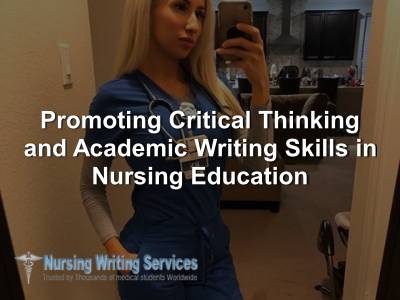Promoting Critical Thinking and Academic Writing Skills in Nursing Education

Nursing education in the USA starts from high school where students interested in the field are advised to excel in Biology, Chemistry and English. Competency in these fields make the pursuit of nursing at tertiary level simpler at the start. There are two options for pursuing tertiary nursing education. The first is the Associate Degree in Nursing (ADN) which takes two years to complete and is offered by Community Colleges. It focuses on imparting specialized technical skills. There is also the Bachelor of Science in Nursing (BSN) Degree which takes four years to complete. BSN graduates will have learned nursing in fullscope - from a technical, theoretical and contextual point of view.
Undergraduate qualification is not the end of the road for nursing. In fact it is not the beginning proper. For one to become a Registered Nurse (RN) in the USA, it is mandatory to get licensure by completing the National Council Licensure Examination (NCLEX). It is possible to get a nursing job in a particular State with this certification. Nurses can pursue Graduate education to advance their knowledge and practice. Options for post-graduate education in nursing are Master of Science in Nursing (MSN), Doctor of Philosophy (PhD) or Doctorate of Nursing Practice (DNP)
Critical Thinking Skills in Nursing Education
Nursing education entails gaining clinical knowledge and the profession is also considered a calling. Nurses are expected to be compassionate individuals. This is not the only soft skill a nurse needs though. Critical thinking is another soft skill that nurses continuously develop in their career from what they build in school. This particular skill enables nurses to do proper assessment and make more accurate decisions.
Critical thinking skills come into use in nursing when, for instance, a nurse addresses medical and administrative issues in his or her daily routine. The former will involve interpreting information like lab reports, carrying out analysis to determine a patient’s problem, justifying one’s actions by explaining to colleagues and patients. Self-regulation is another component of critical thinking that serves well the trial and error nature of treatment approach as it guarantees patient safety.
Critical thinking contributes to a nurse not only becoming a better professional but also a well-rounded individual. How so? Development of critical thinking skills leads to development of other personal attributes like creativity and confidence. Critical thinking skills also lead to better approaches to teamwork and resolution of conflict as demonstration of interpersonal skills development.
Academic Writing Skills in Nursing Education
Critical Thinking skills also come into use when carrying out academic nursing writing assignments. A student becomes able to express his or her ideas with clarity and have insight to point to relationships between variables. This is a great thing because writing makes up to 35% of a nurse’s daily activities. If one becomes an excellent academic nursing writer then one has an improved chance of becoming a highly successful nurse.
Academic nursing writing comes in many formats like essays and research papers. But they all test students on the same four types of academic writing. There is descriptive writing which requires a student to detail facts, analytical writing for showing relationships between variables, persuasive writing for sharing one’ point of view and critical writing which requires that the author (student) breakdown multiple points of view including one’s own.
Imparting academic writing skills in nursing education is worthwhile because excelling in it determines the possibility of successfully completing a nursing academic program. Nursingwritingservices.com is a professional writing services provider that helps students and registered nurses author world class manuscripts. The academic writing skill gained in nursing education serves a purpose even in the professional setting as a nurse will always be able to write with clarity and in proper format.
Improving Critical Thinking and Academic Writing Skills
The best way to begin improving critical thinking and academic writing in nursing education is by picking the right approach. Critical thinking requires thorough investigation of a problem while academic writing needs indepth research. Therefore, it is good practice to adopt a bottom-up mindset when tackling challenges in both domains. This method normalizes evidence-based conclusions which lead to better targeted solutions to problems and a firm basis for a nursing academic writing assignment.
A second lesson to impart is on eliminating bias when engaged in academic writing or critically thinking over an issue. The reason is because bias will taint the conclusions and more often than not lead to incorrect answers - so to speak. How do you eliminate bias in academic writing and critical thinking? For the latter, nursing education teaches students on how to map their thinking process. Combine this with the practice on evidence-based conclusion and it becomes easy to pin-point where biases come in. Bias is eliminated in academic writing by relying on research methodology or arriving at conclusions logically drawn from research undertaken.
Nursing education also encourages students to gain experiential knowledge in these two areas by attaching themselves to mentors. For academic writing, this would be more accomplished writers or simply reading and writing more academic papers to get feedback on quality of authorship. How about critical thinking skills? It is good practice to observe the decision-making techniques of more experienced nurses and even ask them for advice. Joining professional nursing networking groups is another avenue of gaining these critical thinking skills.
It is necessary that nursing education continues training students on critical thinking and academic writing skills. This will maintain the condition of education institutions churning out well-developed nurses. These nurses not only go on to provide the essential service of medical care support but they also become equipped with knowledge on how to conceptualize improving the nursing profession.

